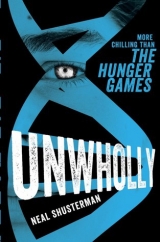
Текст книги "UnWholly"
Автор книги: Neal Shusterman
сообщить о нарушении
Текущая страница: 8 (всего у книги 27 страниц)
Part Three

Windows of the Soul
Collected on the Internet, October 2011:
Kidney and other organ prices on the global criminal markets are based upon publicly available reports and are quoted in U.S. dollars. The price represents the amount either paid to the seller of the organ or the price paid by the buyer for the organ.
Average paid by kidney buyer: $150,000
Average paid to seller of kidney: $5,000
Kidney broker in Yemen: $60,000
Kidney broker in the Philippines: $1,000 to $1,500
Kidney buyer in Israel: $125,000 to $135,000
Kidney buyer in Moldova: $100,000 to $250,000
Kidney buyer in Singapore: $300,000
Kidney buyer in United States: $30,000
Kidney buyer in China: $87,000
Kidney buyer in Saudi Arabia: $16,000
Kidney seller in Bangladesh: $2,500
Kidney seller in China: $15,000
Kidney seller in Egypt: $2,000
Kidney seller in Kenya: $650
Kidney seller in Moldova: $2,500 to $3,000
Kidney seller in Peru: $5,000
Kidney seller in Ukraine: $200,000
Kidney seller in Vietnam: $2,410
Kidney seller in Yemen: $5,000
Kidney seller in the Philippines: $2,000 to $10,000
Liver buyer in China: $21,900
Liver seller in China: $3,660
Courtesy of
www.havocscope.com
11 • Smoker
The boy is certain he’s going to die.
He sprained his ankle falling into the pit, maybe even broke it. Now it’s swollen and blue, and has been that way for days. It’s bad, but it’s not the worst of his problems.
The pit is more than ten feet deep, and even if his ankle were fine, he’d never be able to climb out. For five days he’s been screaming for help, and now his voice is nothing but a dry rasp.
And all because of those stupid cigarettes.
It had been weeks since he had a smoke. His supplier had been arrested again, and although there were kids at school who bragged about smoking, no one would offer him a cigarette, or even give him the name of a dealer. That’s why he came to this part of town—a warehouse district of unused, rotting buildings, many of which were condemned, but no one wanted to waste the money or energy it would take to tear them down.
He knew if he was ever going to score himself some smokes again, this was the place to do it. Even if it was just one or two from some skank nic addict, it would be worth it. That day was the third time he detoured through the warehouse streets on the way home from school, and nothing. No one. It seemed not even the nic addicts found the warehouse district worthy of their attention.
So imagine his surprise when he saw an open door, and cigarette butts strewn on the ground in front of it, like they had no better place to be.
He stepped into the rotting building. The huge space smelled of evolving mold, and paint chips littered the ground like a fall of leaves.
Then he saw it—way at the back of the warehouse was a mattress. It was dirty, shredded, probably the digs of some homeless dude. Nothing was remarkable about it. What was remarkable was the unopened carton of cigarettes sitting on the mattress.
He couldn’t believe his luck! He looked around to make sure there was no one there, then hurried to the mattress, and, stepping onto it, reached for the cigarette carton.
Even before he touched the carton, the mattress fell out beneath his feet and plunged into the pit. Although the mattress had mostly broken his fall, his right ankle hit the ground unprotected. He almost blacked out from the pain, and when his vision cleared he realized what had happened.
He was furious. His initial thought was that this was some sort of practical joke—as if his buddies from school would be looking down at him at any moment, pointing and laughing, calling him an idiot. But he quickly came to understand that this was not a joke at all. This was a trap.
But if this was a trap, why had no one come for five days?
There had been a jug of water and a box of crackers at the bottom of the pit on the day he fell in, along with a ceramic pot to relieve himself in. Whoever set the trap didn’t want him to starve, but he did not do well with the rationing. The food and water was gone in three days, and now there’s nothing left but a lousy carton of cigarettes, which he can’t smoke because there aren’t any matches. At one point he tried to eat the tobacco right out of the wrapper, figuring it might have some nutritional value, but it only made him dry-heave.
Now, with day five coming to an end, he’s convinced no one’s coming for him. No one’s going to find him until it’s too late.
Then, just before dark, he hears footsteps crunching the paint chips on the warehouse floor.
“Hey,” he tries to yell, “over here!” His voice is barely a hiss, but it’s enough. A face appears, looking down at him.
“My God, what are you doing down there? Are you okay?”
“Help . . .”
“Hold tight,” says the man. He goes away and comes back a few moments later with an aluminum ladder, which he lowers into the pit. Although the boy has no strength to even stand, some secret reserve of adrenaline fuels his climb and helps him bear the pain of putting weight on his ruined ankle. In half a minute he’s out of the pit, throwing his arms around the stranger who saved him.
The man sits him down. “Here, have something to drink,” he says and hands the boy a water bottle. The boy guzzles it like it’s the only water in the world. “How long have you been down there?”
“Five days.” He gags as he tries to swallow the water, almost throwing it up, but he manages to keep it down.
The man kneels to him, shaking his head. “AWOL Unwinds are always getting themselves into trouble. You gotta be more careful.”
The boy shakes his head. “I’m not an Unwind.”
The man grins and nods knowingly. “Yeah, yeah, that’s what they all say. Don’t worry. Your secret is safe with me.”
Then the boy feels a sudden prick on his arm.
“Ouch!” He sees a drop of blood on his forearm, which the stranger collects with a small electronic device. “What are you doing?”
The man ignores him, looking at the readout of the device. The boy’s aunt is a diabetic, and she checks her blood sugar with something like it, but the boy suspects this device has a different purpose, although he’s not sure what that purpose is.
“Hmm,” says the man, raising an eyebrow, “it looks like you’re telling the truth. Your DNA doesn’t match any of the kids in the AWOL Unwind database.”
“Oh, I get it. You’re a Juvey-cop!” He’s relieved, because a Juvey-cop is safe. A Juvey-cop will take him home to his parents, who must be worried sick.
“Well . . . I was a Juvey-cop,” the man says, “but I’m no longer in that line of work.” Then he holds out his hand to shake. “The name’s Nelson. And you are?”
“Bennett, Bennett Garvin.” Only now that he’s had some water and some time does he focus enough attention to get a good look at Nelson. He’s unshaven, his nails are dirty, and it appears he hasn’t been taking good care of himself. But the most startling thing about him are his eyes. There’s a strange disconnected intensity about them that doesn’t match the rest of him. In fact, the eyes don’t even match each other. Two different shades of blue. It’s unnerving.
“Could you call my parents?” Bennett asks. “Let them know you’ve found me?”
The faint smile never leaves Nelson’s face. “Oh, I don’t think that will be happening today.”
Bennett doesn’t say anything as he struggles to grasp the situation—but having not eaten, and with the water not yet in his system, everything seems a little fuzzy.
“I can’t let you go now that you’ve seen me.” Then Nelson grabs him roughly, squeezing his arm, poking his side, and putting a dirty hand in Bennett’s mouth to check his teeth like a horse. “Aside from that nasty ankle, you’re a top-notch specimen. A little dehydrated, but nothing a few more water bottles won’t take care of. And the black market harvesters don’t care whether you’re an official Unwind or not—they pay just the same.”
“No!” Bennett tries to pull free, but he doesn’t have the strength. “Please don’t hurt me!”
Nelson laughs. “Hurt you? I wouldn’t think of it. The better your condition, the more you’ll be worth to me.”
“My parents have money. They’ll pay you.”
“I don’t do ransoms,” he tells him, “but I’ll tell you what—I like your eyes, they’re very expressive. And because I like your eyes, I’ll give you a fighting chance.” Nelson points to the entrance. “If you can get to the front door before I tranq you, I’ll let you go. Hell, I’ll even give you a ten-second head start.” He hauls Bennett to his feet. “Ready, set, go!”
Bennett does not need a second invitation. He takes off across the expanse of the warehouse, feeling dizzy, feeling like his feet won’t move. But somehow, he makes them go.
“One!”
His ankle throbs, but he ignores it. His lungs ache, but he doesn’t care. He knows this is life and death. The pain is only temporary.
“Two!”
Paint chips crush beneath his feet like eggshells.
“Three!”
Water sloshes in his belly, making it ache even worse, but he doesn’t let it slow him down.
“Four!”
The door to the warehouse is open wide. The twilight spilling through the door is as glorious as the bright light of a midday sun.
“Five!”
A few yards to go—he’s almost there!
“Six-seven-eight-nine-ten!”
Even before he realizes he’s been cheated, the tranq dart hits him right in the back of his neck, delivering a full dose directly into his brain stem. His legs buckle beneath him, and suddenly that door that seemed so close might as well be a million miles away. His eyes cross, his vision blurs, and he smells musty toxicity as the side of his head hits the ground. He fights to keep conscious, while above him looms the shadow of Nelson, a dark ghost in a fading field of vision. . . . And the moment before he loses consciousness, he hears Nelson say:
“I really do like your eyes. I like them much more than the ones I have now.”
12 • Nelson
J. T. Nelson knows he’ll never get rich selling careless kids to black market harvesters. Even back when his catches were legitimate, there was no real money in it—but then it didn’t matter. When he was a Juvey-cop, he was willing to accept a steady salary, health benefits, and the promise of a pension. He had been more than satisfied with his place in life, maintaining order and bringing AWOLs to justice. But all that changed on the day the Akron AWOL took him out with his own tranq gun. Nearly a year later, he still can’t get the image of Connor Lassiter out of his mind: that smug, arrogant look on his face as he shot the tranq bullet into Nelson’s leg.
For Nelson, that was a shot heard round the world.
From that moment on, his life was a living hell. He was the butt of jokes—not just in his department, but around the nation. He was held up to ridicule, as the cop responsible for letting the infamous Unwind go. So Connor Lassiter became legend and Nelson lost his job, and his self-respect. Even his wife left him.
But he only wallowed for a little while. He was full of anger but knew how to take anger and mold it into something useful. If the Juvenile Authority no longer wanted him, he might as well be in business for himself. Black marketeers don’t laugh at him for having let Connor Lassiter get away, and they ask no questions.
At first it was just AWOLs. They were quick to fall for his various traps like the stupid kids they are. Then he caught his first runaway, a kid whose DNA didn’t show up on the AWOL Unwind database. He thought the black marketeers would turn him away, but they didn’t care. As long as the subject was healthy, he got his price. There were even kids like the one he caught today, who were just unlucky. He’s happy to take them, too. His conscience doesn’t bother him.
What bothers him are their eyes.
That’s what he has the most trouble with. The way they look at him. Those fearful, pleading expressions, always hopeful down to the last second, as if he might have a change of heart. Those eyes plague him in his dreams. They’re windows of the soul, aren’t they? But in those early days as a parts pirate, when he looked at his own eyes in the mirror, he didn’t see what he saw in theirs. His “windows” showed no such expression of soulfulness, and the more he looked at his own empty eyes, the more jealous he became. He wanted some of that innocence, that desperate hope for himself. So one day he went to his black market contact and claimed the eyes of his latest catch as part of his payment. He was only able to negotiate himself a single eye, but at least that was better than nothing. After that first operation, when he looked at himself in the mirror, he would see in that eye a shred of humanity, and for a little while, he’d be high on hope. It would remind him of the idealistic young man he had once been many years before. One problem, however: Now he had one blue eye and one brown. That wouldn’t do.
So he claimed another, but that eye didn’t quite match the first. So he claimed another, and another, and with each operation he felt a sliver of innocence return to him. He knows that someday soon he’ll find the eyes that will make him perfect, and then he can finally rest . . . because by seeing the world through other’s eyes, Nelson is bit by bit becoming whole.
• • •
The black marketeer wears an expensive European suit and drives a Porsche. He looks more like a legitimate businessman than a shady figure who deals in flesh. He doesn’t hide the fact that his business has made him rich. Instead he flaunts his wealth with the entitled disregard of royalty. Nelson envies him his style.
He goes by the name Divan, like some sort of fashion designer, and doesn’t refer to himself as a black marketer, but as an “independent supplier.” His offshore harvest camp is hidden and mysterious. Not even Nelson knows where it is, and he suspects its operation has none of the strict regulations of American harvest camps.
He meets Nelson in Sarnia, a Canadian town just across the bridge from Port Huron, Michigan. Divan cannot step on American soil. There are numerous warrants out for his arrest. But the Canadians, bless them, have been far more tolerant.
Divan takes possession of the boy with the damaged ankle in the back of a car dealership that he uses as his front. As he looks the boy over, he frowns at the swollen ankle and wags a finger at Nelson—all part of his standard ploy to barter Nelson down. The boy, conscious now but still groggy from a heavy dose of tranqs, mumbles incoherently, and although Nelson ignores him, Divan pats him gently on the cheek.
“Don’t you worry about a thing,” he tells the boy. “We are not barbarians.” It’s one of the lines he always uses. It conveys no real information to the boy but somehow comforts him. It’s calculated, like everything else about Divan.
The boy is taken away, a price is negotiated, and, as is his custom, Divan pays Nelson in cash from a money clip filled with countless bills. Then he claps Nelson on the back jovially. Nelson gets more respect as a parts pirate than he ever did from his superiors as a juvenile enforcement officer.
“I can always count on you to bring me what I need. Not all my associates are so consistent. Now that the Juvenile Authority is offering rewards for AWOL Unwinds, I find fewer come my way.”
“Goddamn Cap-17 law,” Nelson says.
“Yes. Let’s hope it’s not a sign that society is slipping back to its old, less civilized ways.”
“Not a chance,” Nelson tells him. “People won’t go back there.”
He was just a child when the Unwind Accord was passed and the war ended—but it’s not the war that sticks in his mind from those days. It’s the fear of the ferals. With the failure of the public school system, the nation was overrun by teenagers out of work, out of school, and with nothing to do even before the war. In fact, that fear triggered the war more than anything else. One side claimed the ferals were created by the collapse of family values, while the other side claimed the ferals were a product of rigid beliefs that no longer met the world’s needs. Both sides were right. Both sides were wrong—but it didn’t matter when people were terrified to go into the streets at night from fear of their own kids.
“Unwinding didn’t just end the war,” Nelson points out to Divan. “It ripped out the weeds. Kept them from choking the rest of us out. Fear of the AWOLs will keep both of us in business.”
“I sincerely hope you’re right.” Divan opens his mouth as if to say more, but thinks better of it.
“Is there something you’re not telling me?”
“Nothing to trouble yourself with. Just rumors. We’ll talk more upon your next visit. And if you could, please keep in mind that I’m experiencing a shortage of girls. Ones with red hair in particular. Also umbers—either gender. And, of course, I’ll always pay a high price for ‘People of Chance.’ ”
“I’ll keep it in mind,” says Nelson, already scheming a way of fulfilling Divan’s request. He’d yet to capture a Native American kid, but one of these days those so-called “People of Chance” would bust and leave Nelson with not just a winning hand, but an entire winning body.
As he drives back across the bridge and onto American soil, his spirits are high. If Divan has worries, they’re unfounded. Although Nelson has, in recent days, chosen the life of an outsider, he still feels he has a finger on the pulse of the times. With so much of the civilized world employing the practice of unwinding, how could anyone deny that it is a viable alternative for the troubled, the useless, and the unwanted? Like the ads say, “Unwinding isn’t just good medicine—it’s the right idea.”
It was the very rightness of the idea that made Nelson become a Juvey-cop to begin with. The knowledge that he would leave the world a cleaner, brighter place by dredging the dregs from the streets was what propelled him into the police academy. Eventually, though, his ideals were replaced by an abiding hatred for those marked for unwinding. They were all alike, these Unwinds; sucking valuable resources from those more deserving, and clinging to their pathetic individuality, rather than accepting peaceful division. They insisted on living lives no one else felt were worth the effort. As an officer of the law, the rules of conduct held him back—but as a parts pirate, he could take care of business much more effectively. So, as much as he blamed Connor Lassiter for ruining his life, perhaps the boy had done him a favor. Still, it is supremely satisfying to know that the Akron AWOL died an ignoble death at Happy Jack Harvest Camp. It gives Nelson hope that maybe there truly is justice in the universe.
13 • Connor
A retired 787 arrives with only fourteen Whollies packed in empty beer barrels in the hold. Connor wonders if someone in the resistance is just getting bored, or if the barrels were really the most inconspicuous way to ship them. The kids all exit the hold cramped and hunched from the ride, and Connor delivers his usual rallying speech, troubled by the diminishing number of kids in each arriving plane.
Then, after they’ve been brought to the IHOP jet for assessment, and to get them ready for life in the Graveyard, Connor returns with Trace to the 787. It’s the old Boeing Dreamliner, the first one of its kind to arrive at the Graveyard. It was once heralded as the salvation of the aviation industry, and it certainly served its purpose, but there’s always something newer, faster, and more fuel-efficient ready to take any jet’s place.
“She’s still impressive,” says Trace, as they walk through the passenger compartment, which is already sweltering in the Arizona sun. “A classical beauty.”
“You think you could fly this plane if you had to?” Connor asks him as they size up the Dreamliner.
Trace grins. “I’ve been flying Cessnas since I was sixteen, and military aircraft for a year before I joined the ADR, so yes, I could fly a commercial airliner. Hell, I could make it do loop-the-loops.”
“Good. You may need to do loops if we’re being targeted.”
Trace puzzles over this for a second, then grins. “Escape jet?”
“If we gut it, we can fit everyone in. Won’t be comfortable, but it’ll work.”
“I’ll research the specs and see if it can handle the weight.”
“We’ll gut the cabin, then have the front-office guys post it all for sale,” Connor tells him. “We’ll include the engine parts and the cockpit console on the sale list, but we won’t really dismantle any of the plane’s actual working parts.”
Trace gets it without having to be told. “So, to anyone keeping tabs on us, it’ll appear that the jet has totally gone to salvage, but we’ll know it’s still operational.”
“Exactly. Then we’ll tow it to the main aisle—make it seem like we’re using it as a dormitory jet.”
“Brilliant.”
“No,” says Connor, “desperate. Now, let’s get out of this thing before we fry.”
• • •
Trace drives Connor back to the main aisle from the runway. In addition to being head of security in the Graveyard, he’s Connor’s acting bodyguard and chauffeur. Not Connor’s idea, any more than the private jet and the blue camo, but it helped create that illusory leadership pedestal. From the beginning, though, Connor hated the idea of being set apart.
“Get used to it,” Risa told him. “You’re not just some random Unwind anymore; to these kids, you are the resistance. You need to project the image of someone in charge.” He wonders if she still feels that way, now that being in charge doesn’t leave enough room in his life to truly be there for her. He wonders if he should invent himself some illness just so he can visit her in the infirmary jet. Is that proper behavior for a leader?
“The Dreamliner is a good idea,” Trace says, bringing Connor back to the here and now. “But I know there are other things on your mind.”
“Always,” Connor tells him.
“I know you’re worried about the Juvies, and why they’re still leaving us alone.” Trace waits a moment, then adds, “I think I know why, but you’re not going to like it.”
“When have I ever liked anything about the Juvies?”
“It’s not about them as much as it’s about you.”
“I don’t follow.”
“You will.” They hit a bump, and Connor reflexively grabs onto the door. Trace makes no apologies for his driving. “See, Connor, the kids here, even though they’ve been legally made nonentities, that doesn’t make them worthless. They’re as valuable as diamonds. Do you know why diamonds are so expensive?”
“I don’t know—because they’re rare?”
“No, they’re not rare. In fact, there are so many of them, they could be as cheap as the fake ones. But there’s this thing called the diamond consortium. All the owners of all the world’s diamond mines get together, and you know what they do? They hide their diamonds in this huge vault in this huge bank in Sweden or Switzerland or wherever. Thousands upon thousands of them. And hiding them creates the illusion that diamonds are rare, driving the prices through the roof.”
The Jeep hits another pothole, and this time Connor absorbs the impact without bracing himself. He follows Trace’s line of thought, beginning to worry about where it’s leading.
“So,” says Trace, “after the Cap-17 law passed, there was a shortage of Unwinds, right? The price for every kind of transplant doubled—tripled even. But people pay the price, because everyone’s used to getting the parts they want, when they want them. They’ll go without food, but they won’t go without their parts.”
“So what does that have to do with me?”
“You tell me.”
Connor considers what Trace had said, and the truth hits him. “We’re the vault! And as long as we pull AWOLs off the street, it keeps the price high. Is that what you’re saying?”
“Better that all those AWOLs are here, nice and safe, than caught by parts pirates and sold on the black market. That would just drive the price down.”
Connor thinks back to that day he was caught and hauled off to Happy Jack Harvest Camp. It had been a shock when the Juvey-cop interrogating him admitted that they knew all about the Graveyard but turned a blind eye, because going after the kids here wasn’t worth the effort.
But this is different.
This makes Connor a willing part of the system. To know that he actually plays into some unwinding consortium’s plan makes Connor feel dirty—worse than dirty.
And then, when the deeper revelation hits him, it’s like a knockout blow. The final punch that leaves him flat on the canvas.
“How long,” he asks Trace, “have you been working for the Juvies?”
Trace just drives the Jeep, keeping his eyes straight ahead, and doesn’t answer for at least ten seconds. Finally he says, “Don’t ask questions you don’t want the answer to.”








